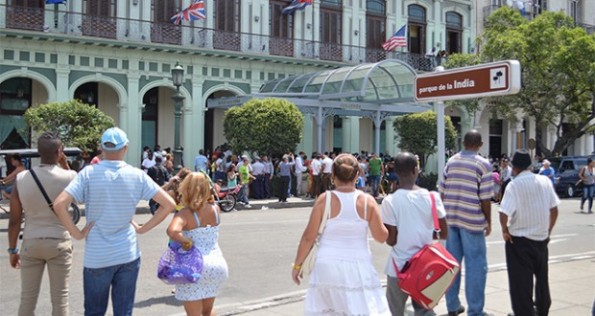 There are not always good arguments for trampling on the jurisdiction of a foreign nation. The Cold War mentality is still latent in the behavior of certain U.S. institutions.
There are not always good arguments for trampling on the jurisdiction of a foreign nation. The Cold War mentality is still latent in the behavior of certain U.S. institutions.
If a government believes in democracy and political freedom, it shouldn’t go around hiding its peaceful efforts to support the democrats in autocratic countries like Cuba.
The performance of USAID in the case of the contractor Alan Gross, jailed for clandestinely introducing satellite internet connections, or of Zunzuneao, the so-called Cuban Twitter, have been burdened by a lack of transparency and professionalism.
Freedom of expression, information and access to the internet are inalienable rights of any citizen. If the government of a country denies them, it is not a punishable crime to allow another person to inform them in some way.
Authoritarian and vertical societies like Cuba possess a bunch of rules that allow them to manage the flow of information at will. This control allows them to govern without hiccups, manipulating adverse opinions or hiding them.
The White House can implement policies that contribute to Cubans having diverse sources of information. But with transparency. And not designing strategies that could be interpreted as interference.
It is positive that the United States Interest Section in Havana operates two free internet rooms, where anyone can go, dissidents or otherwise.
Washington’s policy toward Cuba is generally public and transparent. On the internet it is not difficult to find help or money awarded to opposition groups on the island. A good way to bury this obsessive mania for espionage and mystery.
It must be a goal of the United States that the Radio Martí programming is becoming more enjoyable, analytical and professional. Since the 1960s, the Cuban regime used Radio Havana Cuba as an instrument to sell its doctrines to foreign countries.
With the petrodollars of the late Hugo Chavez, Telesur was created, television dedicated to openly spreading and supporting the most rancid of the Latin American left. That’s their right.
But each person should also be respected, according to his opinions, able to freely access the TV channel he desires, listen to the radio station he prefers, and read his favorite newspapers and digital sites.
For the olive-green autocracy, the 21st century is an ideological struggle. And it has orchestrated a campaign called “the battle of ideas.” But on the national scene, opinions that diverge from the official line are not accepted.
Cable antennas are illegal. Internet costs a price unattainable for most ordinary people. Foreign newspapers and books critical of the status quo are censored.
All that’s left is to listen to shortwave. Or sit in the bar of a hotel, spend four dollars to drink a mojito and watch Spanish CNN. The censorship even goes beyond politics.
Although it’s fair to recognize that Raul Castro has allowed Cubans to see NBA and MLB games, foreign games in which players from the island participate are still banned.
It’s the same in the literary, intellectual and musical fields. The singing Willy Chirino, the composer Jorge Luis Piloto, the poet Raul Rivero, the columnist Carlos Albert Montaner, or the writer Zoe Valdez, are prohibited from visiting their homeland for being convinced anti-Castroites.
The Castro brothers suffer from a rare mania: they consider themselves the legitimate owners of the nation. And know how to sell themselves as victims. And mor than a few times, U.S. and European institutions, with their Cold War mentality, give them ammunition.
Iván García
Photo: Flags of Cuba, United States, United Kingdom and the European Union, among others, waving on the balcony of the Hotel Saratoga, where in April 2013 Beyoncé and her husband , rapper Jay -Z stayed. The pretext for the couple to spend three days in Havana was celebrating their fifth wedding anniversary. It was speculated that behind the visit could be Barack Obama, friend of the artists. True or not, the journey was questioned in Cuba and in the United States. Taken from Cubanet .
29 April 2014
